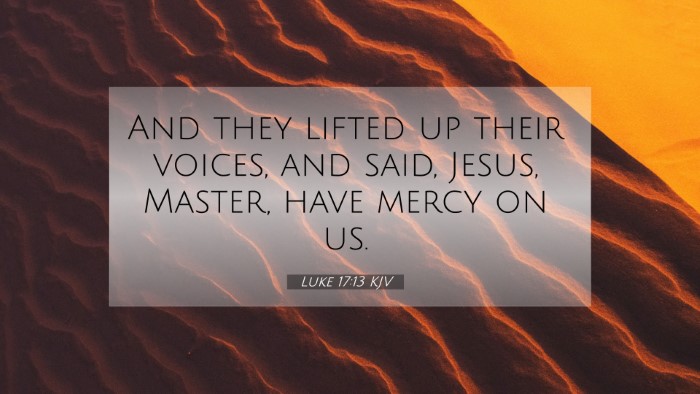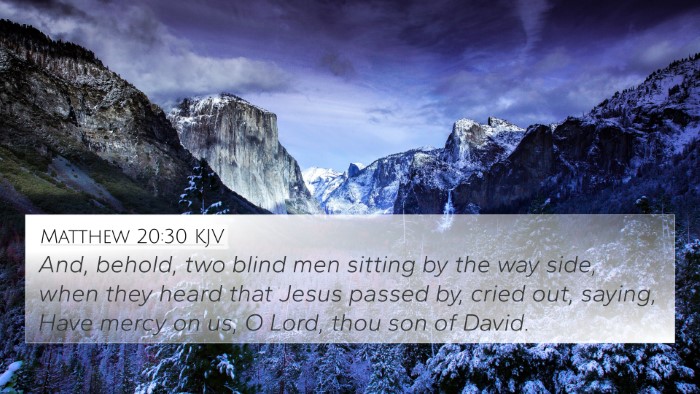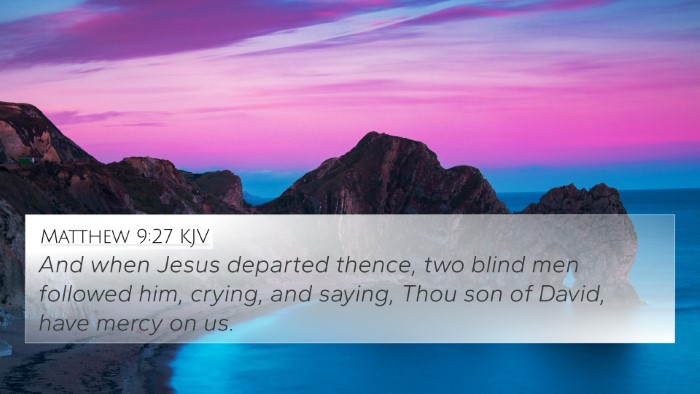Understanding Luke 17:13
In Luke 17:13, the verse reads: "And they lifted up their voices, and said, Jesus, Master, have mercy on us." This plea from ten lepers encapsulates profound themes of desperation, faith, and the nature of Jesus’ ministry. Below, we will explore the meaning and implications of this verse by combining insights from public domain commentaries.
Summary of Verse Meaning
The cry for mercy from the lepers represents a universal human condition of need and the awareness of one's plight. It underscores the recognition of Jesus not just as a healer, but as a Master, emphasizing His authority and compassion. Their collective voice denotes the power of unity in faith and desperation.
Commentary Insights
-
Matthew Henry:
Henry notes that the lepers were in a desperate condition, isolated from society due to their affliction. Their appeal to Jesus highlights the belief in His ability to heal and emphasizes that true mercy is sought through acknowledgment of one’s need.
-
Albert Barnes:
Barnes points out the significance of Jesus being addressed as “Master.” The title reflects respect and recognition of Jesus' divine authority. Additionally, the cry for mercy suggests that the lepers understood their unworthiness, appealing to God's grace rather than their own merits.
-
Adam Clarke:
Clarke suggests that the lepers’ call was not merely for physical healing but also for spiritual restoration. This verse calls readers to consider the holistic nature of Jesus' ministry, which addresses both physical ailments and the deeper spiritual needs of humanity.
Bible Cross-References
This verse relates to several other passages, offering insights into its themes:
- Matthew 9:36: "But when he saw the multitudes, he was moved with compassion on them..." - Reflects Jesus’ compassion towards those in need.
- Mark 1:40-42: The healing of the leper shows Jesus’ power and willingness to heal those marginalized by society.
- Luke 18:38-39: The blind man calls out for mercy, paralleling the lepers’ cry for help.
- John 1:29: John the Baptist refers to Jesus as the Lamb of God, implying His role in delivering mercy and cleansing sin.
- James 2:13: "For judgment is without mercy to the one who has shown no mercy." - Highlights the importance of mercy in Christian faith.
- Matthew 15:22: A Canaanite woman cries out for Jesus’ mercy, emphasizing the universality of seeking divine help.
- Psalm 51:1: "Have mercy upon me, O God, according to thy lovingkindness..." - A heartfelt appeal for divine mercy, akin to that of the lepers.
Connections Between Bible Verses
Exploring the connections between Luke 17:13 and related scriptures reveals a broader biblical narrative concerning mercy, healing, and faith.
- Connecting Themes: The concept of mercy is woven throughout scripture, demonstrating God's character and His dealings with humanity.
- The Role of Faith: Many parallel verses illustrate the essential nature of faith in receiving God’s mercy and healing.
- Jesus' Ministry: Each reference highlights aspects of Jesus' mission – compassion, authority, and a call to faith.
Conclusion
Luke 17:13 serves as a poignant reminder of humanity's need for divine mercy and the assurance that Jesus is both willing and able to respond to such pleas. Through comparative Bible verse analysis and thematic connections, one can better understand the richness of scripture and the critical inter-Biblical dialogues surrounding the themes of mercy and faith.








